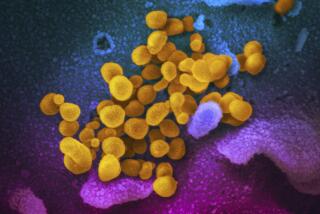Niacin-and-statin trial raises bigger questions about cholesterol
- Share via
The already confusing world of cholesterol control just got a little murkier. If you’re taking a combination of niacin (brand name Niaspan) along with a statin to protect your heart, news from the National Institutes of Health will make you want to seriously rethink your treatment. It may also leave you wondering: How important is cholesterol anyway? And how hard should you try to get the “right” numbers?
For the Record, 1:06 p.m., June 2: A previous version of this post said the NIH stopped the trial after 32 months because it appeared the drug might be harming more patients than it helped. It also said that a possible increase in stroke risk was what put an end to the study. The NIH said the agency ended the study because the addition of niacin did not seem to lower the risk of a cardiovascular event or stroke. It said that the possible increase in stroke risk was a “contributing factor” in the decision to end the study.
Here’s the story: The NIH just stopped a study of niacin — a B vitamin that boosts HDL or “good” cholesterol — after only 32 months.* In the study, roughly 1,700 patients with heart disease took niacin along with a cholesterol-lowering statin, while about the same number took a statin alone. Disappointingly, the combo treatment didn’t seem to work any better than the statin. During the study, each group was equally likely to suffer a heart attack or other cardiac “event.”
To make things worse, people taking both niacin and statins were slightly more likely to suffer a stroke. That’s one of the aspects making doctors take note.* The stroke risk may or may not turn out to be real. Strokes were uncommon in each group, striking just 1.6% of patients taking niacin and 0.7% of patients taking statins alone. The niacin group may have simply had slightly worse luck.
But why didn’t the niacin do any good? Niacin has a proven ability to raise HDL or “good” cholesterol by about 10% to 30%. This is the type of cholesterol that supposedly helps clear plaque from your arteries. People who naturally have high levels of HDL (in the neighborhood of 45 mg/dl or more) are less likely to to suffer heart attacks. Doctors have long assumed that artificially boosting HDL with medications would protect the heart, but such benefits have been hard to prove.
Doctors will be debating the importance of HDL cholesterol vigorously for years, but the basic message is already clear: Heart disease is far more complicated than any single number.
It’s never a good idea to stop taking a medication without talking to your doctor -- but if you’re currently taking niacin along with a statin, this is a great time to ask if you can simplify your treatment and save yourself some money. Whether you stay on niacin or get off it, remember the big picture: Get your exercise, eat well and stay away from cigarettes. Studies come and go, but the basics of heart health will never change.
[For the Record, 1:06 p.m., June 2: A previous version of this post said the NIH stopped the trial after 32 months because it appeared the drug might be harming more patients than it helped. It also said that a possible increase in stroke risk is what put an end to the study. The NIH says the agency ended the study because the addition of niacin did not seem to lower the risk of a cardiovascular event or stroke. It says that the possible increase in stroke risk was a “contributing factor” in the decision to end the study.]
Related: Doctors rethinking prescribing Abbott’s Niaspan
Related: NIH halts niacin-and-statin trial early






